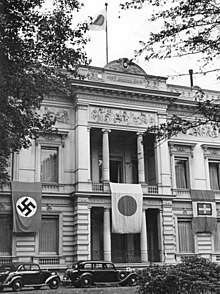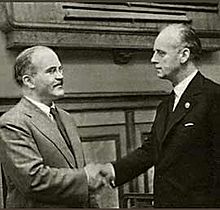Foreign relations of Nazi Germany
From the late 1930s to its defeat in 1945, Germany was the most formidable of the Axis powers - a military alliance between Imperial Japan, Fascist Italy, and their allies and puppet states.
Adolf Hitler made most of the major diplomatic policy decisions, while foreign minister Konstantin von Neurath handled routine business.
[1] Following the Treaty of Versailles in 1919, Germany succumbed to a considerably weakened position in pan-European politics, losing all its colonial possessions, Alsace-Lorraine, Poland and part of Ukraine, and all its military and naval assets.
Britain and France decided not to respond with force and Hitler immediately expanded his plans, turning to "lebensraum" -- or an expansion to the east.
Germany remilitarized the Rhineland, formed an alliance with Mussolini's Italy, sent massive military aid to Franco in the Spanish Civil War, annexed Austria, took over Czechoslovakia after the British and French appeasement of the Munich Agreement, formed a peace pact with Joseph Stalin's Soviet Union, and finally invaded Poland.
[6][7] Having established a "Rome-Berlin axis" with Benito Mussolini, and signing the Anti-Comintern Pact with Japan – which was joined by Italy a year later in 1937 – Hitler felt able to take the offensive in foreign policy.
)[8] Germany's foreign policy during the war involved the creation of friendly governments under direct or indirect control from Berlin.
Although Japan was officially a powerful ally, the relationship was distant and there was little coordination or cooperation, such as Germany's refusal to share the secret formula for making synthetic oil from coal until late in the war.
[11] DiNardo argues that in Europe Germany's foreign-policy was dysfunctional during the war, as Hitler treated each ally separately, and refused to create any sort of combined staff that would synchronize policies, armaments, and strategies.
On 9 August 1943, Hitler summoned Tsar Boris III of Bulgaria to a stormy meeting at field headquarters, and demanded he declare war on Russia.
American news reports stated that Hitler tried to hit him and the tsar suffered a heart attack at the meeting; he died three weeks later.
Other Jews continued to be employed in forced labor camps where many died from starvation, abuse, exhaustion, or being used as test subjects in deadly medical experiments.
All German spies in Britain were "turned" and were used to feed false information that misled Berlin into defending the wrong landing zones during the Allied invasion of June 1944.
In this hidden agenda, the Nazi's and the Soviet Union carved Poland, Lithuania, Estonia, Finland, and Bessarabia into spheres of influence.
Stalin anxiously wanted to add Bulgaria to the Soviet sphere, but Hitler convinced it and most of the other Balkan states to formally join the Axis.
[26] Foreign Minister von Neurath]] very much believed in maintaining Germany's good relations with China and mistrusted Japan.
The 1931 Japanese invasion of Manchuria had shown Chiang and the Chinese leadership the need for military and industrial modernization and they wanted German investment.
In the early part of World War II, Germany's foreign relations with Spain heavily revolved around propaganda efforts.
To make this goal a reality, Nazi Germany sent Hans Josef Lazar to Spain to head the country's pro-Nazi regime propaganda efforts.
When Germany started to falter in its war performance, Spanish news agencies began to print less and less pro-German propaganda within their publications.
[31] These radio stations attempted to support the Nazis covertly, but it did not take long for observers to uncover the German bias in its messaging.
[32] Nazi German government representatives cultivated ties with the Muslim religious leaders in the early 1940s, such as Hajj Amin al-Husseini, the Grand Mufti of Jerusalem.
To weaken the British Empire, Nazi Germany expressed support for hardline Indian revolutionaries seeking India's independence.
[33] Although the Indian National Congress officially opposed Nazi, it refused to support the British war effort and its leaders were imprisoned.
With Japanese military backing, Bose formed the Provisional Government of Free India and the Indian National Army to fight British forces, but he was decisively defeated.
[34] Hitler's speeches sometimes did mention return of the lost African colonies, as a bargaining point, but at all times his real target was Eastern Europe.


